Budgies, also known as parakeets, are delightful and popular pets for their vibrant colors and cheerful demeanor.
As budgie owners, it is crucial to understand their behavior to ensure their well-being and happiness. One common concern that can arise is when budgies start making whimpering noises, leaving owners puzzled and worried about their feathered companions.
This article will delve into the intriguing world of budgie vocalizations and explore the reasons behind these unusual whimpering sounds.
By examining the potential causes, identifying the distinguishing characteristics of whimpering noises, and discussing the necessary steps to address them, we aim to provide valuable insights and guidance for budgie owners.
If you have ever wondered, “Why is my budgie making whimpering noises?” This article seeks to shed light on this question and empower you to better understand and care for your feathered friend.
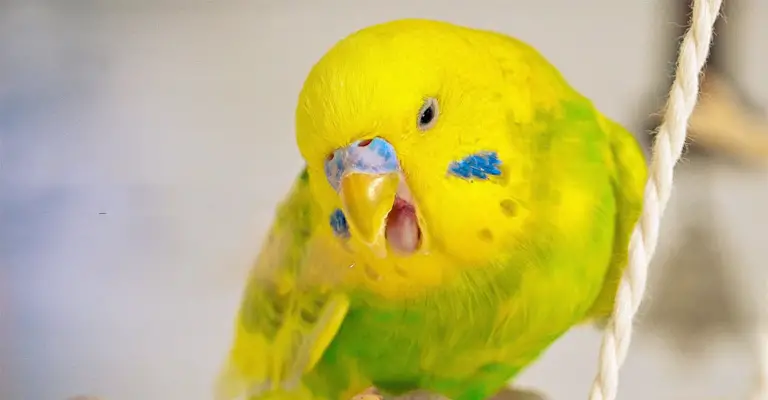
Why Is My Budgie Making Whimpering Noises?
It can be concerning and confusing when budgie owners hear their feathered friends making whimpering noises.
Understanding the reasons behind these sounds is essential for ensuring the well-being of your budgie. Let’s explore some common causes of whimpering noises in budgies and how to address them.
Budgies are known for their wide range of vocalizations, which serve various purposes, including communication, bonding, and expressing emotions.
Whimpering noises, however, are not typical sounds that budgies make, and they may indicate underlying issues that require attention.
Potential Causes Of Whimpering Noises In Budgies
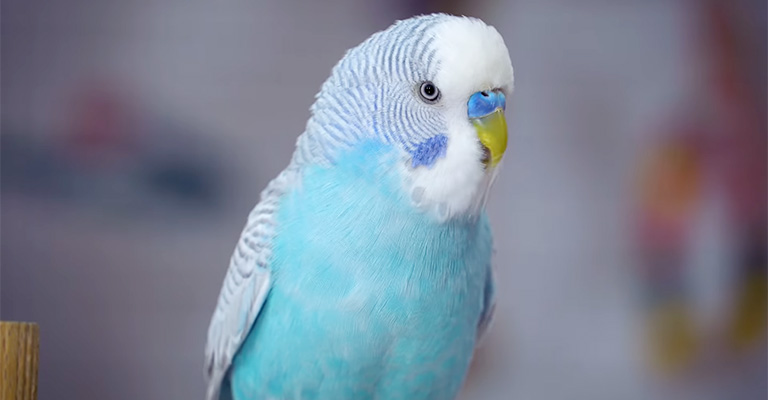
Like any living being, Budgies can experience a range of physical and emotional issues that may manifest as whimpering noises. Understanding the potential causes behind these sounds is crucial for appropriately caring for your budgie.
Physical Discomfort
Illness or Injury
Budgies may whimper if they are unwell or have suffered an injury. Common health issues in budgies include infections, feather plucking, and broken bones. Prompt veterinary attention is necessary to diagnose and treat such conditions.
Respiratory Issues
Whimpering noises can indicate respiratory problems like infections, allergies, or respiratory tract obstructions. These issues can impact a budgie’s breathing and well-being, requiring immediate medical intervention.
Digestive Problems
Digestive disorders, such as crop impaction or infections, can cause discomfort in budgies, leading to whimpering noises. Dietary changes, adequate hydration, and veterinary care can help manage these issues effectively.
Emotional Distress
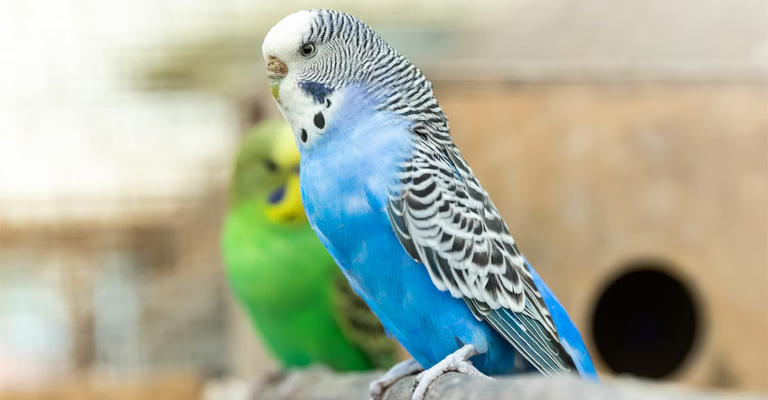
Loneliness or Boredom
Budgies are highly social birds and can become distressed if they feel isolated or lack stimulation. Whimpering noises may indicate a need for companionship, interactive toys, or engaging activities to alleviate boredom.
Anxiety or Fear
Budgies are sensitive creatures and may exhibit whimpering noises when feeling anxious or fearful. Stressful environments, sudden changes, or previous traumatic experiences can contribute to these emotions. Providing a calm and secure living space is vital to reduce anxiety levels.
Environmental Factors
Noise Pollution
Excessive noise, such as loud music, construction sounds, or household appliances, can be stressful for budgies.
Whimpering noises may be their way of expressing discomfort due to the overwhelming auditory stimulation. Minimizing noise levels in their environment is essential.
Changes in Routine or Surroundings
Budgies thrive on routine and familiarity. Significant changes in their surroundings, such as relocation, the introduction of new pets, or alterations to their cage or play area, can trigger whimpering noises as they adjust to the unfamiliar. Gradual introductions and maintaining a stable routine can help alleviate their distress.
Identifying Whimpering Noises In Budgies
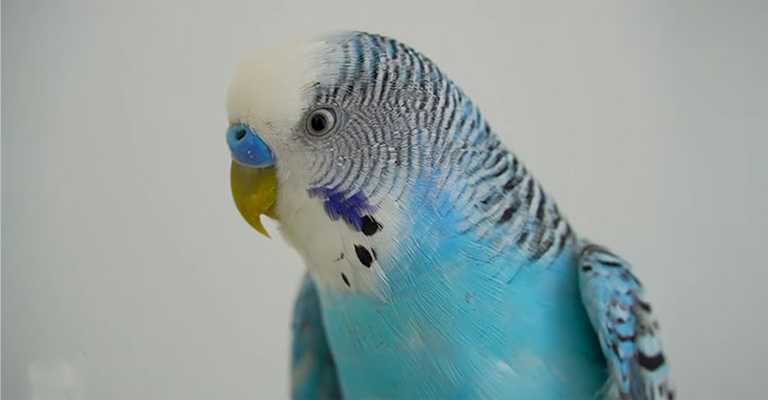
Whimpering noises in budgies can concern owners, but understanding their characteristics and distinguishing them from other vocalizations is crucial in identifying the cause.
By paying attention to their vocalization patterns and observing their body language and behavior, you can gain valuable insights into the underlying reasons behind the whimpering sounds.
Characteristics Of Whimpering Noises
Whimpering noises in budgies are typically soft and high-pitched, distinct from their usual chirping or tweeting sounds. They may sound more like a gentle whimper or a soft whine.
Understanding the unique quality of these sounds can help you recognize when your budgie is expressing discomfort or distress.
Differentiating Whimpering From Other Vocalizations
It is crucial to differentiate whimpering noises from different types of vocalizations your budgie may make. For instance, chirping can indicate contentment, while squawking is often a sign of excitement or warning.
By familiarizing yourself with their different vocalizations, you can better pinpoint when your budgie is whimpering.
Observational Cues: Body Language And Behavior
In addition to vocalizations, observing your budgie’s body language and behavior can provide further clues about their distress.
Fluffed feathers, a hunched posture, reduced activity, or changes in eating or grooming habits may accompany whimpering noises. These visual cues help paint a more comprehensive picture of your budgie’s well-being.
Diagnostic Steps For Budgie Owners
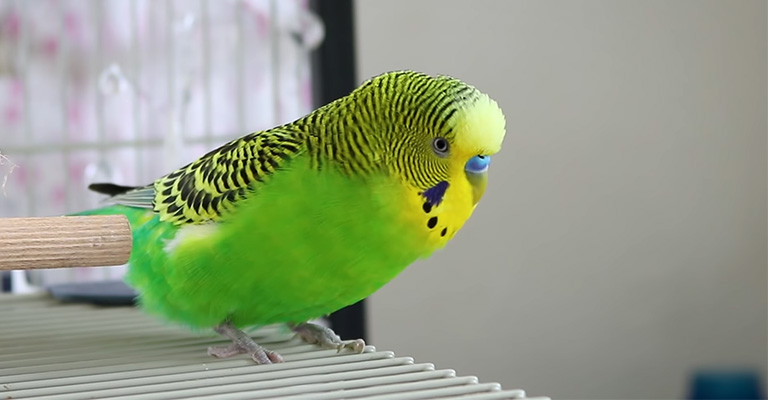
If your budgie is making whimpering noises, taking specific diagnostic steps to determine the underlying cause and provide appropriate care is essential. These steps will help you gather information and effectively assess your budgie’s condition.
Monitoring The Frequency And Duration Of Whimpering Noises
Pay attention to how often and for how long your budgie makes whimpering noises. Keeping a log can help identify patterns or triggers contributing to the behavior.
Examination Of Physical Symptoms
Observe your budgie for any accompanying physical symptoms, such as difficulty breathing, changes in appetite, or abnormalities in droppings. These signs can provide valuable clues about potential health issues.
Seeking Professional Veterinary Assistance
Suppose your budgie’s whimpering noises persist or are accompanied by physical symptoms. In that case, it is crucial to consult a qualified avian veterinarian.
They have the expertise to conduct a comprehensive examination, perform necessary tests, and provide an accurate diagnosis and treatment plan.
Addressing Emotional Distress In Budgies
As highly social creatures, Budgies can experience emotional distress, which may manifest as whimpering noises. Addressing their emotional well-being is essential for a happy and contented budgie.
Socialization And Interaction
Budgies thrive on social interaction, so ensure they have plenty of opportunities to interact with you and other budgies if you have multiple birds. Spend quality time playing, talking, and bonding with your budgie to alleviate loneliness.
Providing Mental Stimulation And Enrichment
Budgies are intelligent birds that require mental stimulation to prevent boredom. Offer a variety of toys, puzzles, and foraging activities to keep their minds engaged. Rotate toys regularly to maintain their interest and provide new challenges.
Creating A Calming And Secure Environment
A tranquil and secure environment is vital for budgies to feel safe and comfortable. Minimize sudden loud noises and provide a peaceful atmosphere. Place their cage in a quiet area away from high traffic or other stress-inducing stimuli.
When To Seek Professional Help
If you notice your budgie making persistent or worsening whimpering noises, it is essential to seek professional help. These vocalizations may be an indication of an underlying issue that requires attention.
Additionally, suppose your budgie exhibits any associated physical symptoms alongside the whimpering noises. In that case, it further emphasizes the need for veterinary intervention.
Persistent Or Worsening Whimpering Noises
If your budgie continues to make whimpering noises over an extended period or if the intensity of the sounds increases, it is crucial to consult a qualified avian veterinarian.
Persistent vocalizations can indicate an underlying health problem or emotional distress that may require medical intervention or behavioral guidance.
Associated Physical Symptoms
Suppose your budgie displays any additional physical symptoms, such as coughing, sneezing, difficulty breathing, loss of appetite, or changes in droppings.
In that case, it is essential to seek professional help promptly. These symptoms may indicate an underlying medical condition that requires diagnosis and treatment.
Professional Advice For Accurate Diagnosis And Treatment
A qualified avian veterinarian possesses the expertise to diagnose the underlying cause of whimpering noises in budgies accurately. They can conduct a thorough examination, including physical assessments, diagnostic tests, and behavioral analysis.
With their professional knowledge, they can provide the appropriate treatment plan to address the specific needs of your budgie.
Frequently Asked Questions
Not necessarily. Budgies have a wide range of vocalizations, and whimpering noises can be a regular part of their communication. However, it’s essential to monitor their overall behavior and health. If other concerning symptoms accompany the whimpering noises or the behavior persists, it’s advisable to consult a veterinarian.
Apart from whimpering noises, signs of illness in budgies may include a loss of appetite, changes in droppings, lethargy, fluffed-up feathers, or visible injuries. If you notice any of these symptoms alongside whimpering noises, it’s crucial to seek professional veterinary advice.
Yes, budgies are social birds that can become vocal when lonely or bored. To alleviate this, provide your budgie with stimulating toys and regular out-of-cage time, and consider getting a companion bird if appropriate.
Creating a calm and secure environment is essential for anxious or fearful budgies. Avoid sudden loud noises, provide hiding spots in the cage, and ensure they have a consistent routine. Gradual exposure to new environments or people can also help reduce anxiety.
Maintaining a healthy diet, providing ample exercise opportunities, offering mentally stimulating toys, and ensuring a safe and clean living environment are critical to promoting your budgie’s overall well-being.
Conclusion
Budgies making whimpering noises can be attributed to various factors, including vocalization, fear, illness, loneliness, or environmental conditions.
Understanding your budgie’s behavior and monitoring their overall health is crucial in determining whether the whimpering noises are cause for concern.
You can ensure your budgie’s happiness and well-being by providing a safe, comfortable, and enriched environment, along with regular veterinary care.
Remember, if you have concerns about your budgie’s health or behavior, it’s always best to consult an avian veterinarian for a proper diagnosis and guidance.